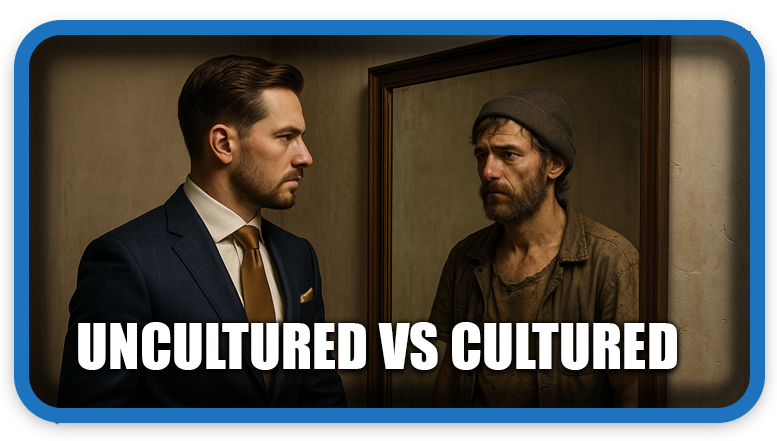⏲️ Estimated reading time: 5 min
Uncultured vs Cultured: Why the Educated Mind Becomes Emotionally Vulnerable, While the Ignorant Often Get Rich. Knowledge brings empathy and deeper emotional understanding, but it can also create vulnerability. The uncultured, by lacking emotional filters, often find it easier to accumulate wealth. Here’s why cultured minds hesitate while the ignorant pursue money ruthlessly.
The Paradox of Culture and Wealth
For centuries, people have asked: why do highly educated, cultured, and intelligent individuals often struggle to accumulate wealth, while some simple or even uncultured people become multimillionaires?
It feels like a paradox: culture and education should be keys to success, but in reality, we often see the opposite.
This article explores in depth the relationship between culture, empathy, emotional vulnerability, and wealth, explaining why ignorance or lack of empathy can be an “advantage” in the pursuit of money, and how the cultured individual can still reach prosperity by mastering emotional balance.
Chapter 1. What Do “Cultured” and “Uncultured” Really Mean?
The Cultured Person
- Educated, knowledgeable, with a wide intellectual horizon.
- Understands not only facts but also the emotions behind them.
- Develops higher empathy and responsibility.
- Thinks critically and carefully considers the impact of decisions on others.
The Uncultured Person
- Lacks broad education or chooses not to use it.
- Pragmatic, focused mainly on personal needs.
- Rarely considers deep emotional consequences.
- Takes “cold” and fast decisions without moral hesitation.
Chapter 2. Culture as Emotional Vulnerability
Why does the cultured person become vulnerable?
Because they can read emotions. This person understands the meaning of suffering, sacrifice, injustice, and pain. That creates:
- Hesitation in decision-making – worrying about others before acting.
- Higher stress and anxiety – because they see too many angles of a problem.
- Greater manipulability – as empathy makes them want to help, often at their own expense.
For example, a cultured business owner considering layoffs might lose sleep over the consequences, while an “uncaring” person would make the cut swiftly.
Chapter 3. Ignorance as a “Cold Advantage” in the Pursuit of Money
The uncultured person feels no heavy emotional burden when making decisions.
For them, money, power, and personal comfort come first.
Advantages of ignorance in wealth accumulation:
- No guilt or remorse → easier to make tough decisions.
- Extreme pragmatism → focused solely on results, not morality.
- Simplified thinking → no time wasted on philosophical dilemmas.
This doesn’t mean all ignorant people are rich, but it does mean ignorance eliminates emotional roadblocks to fast wealth.
Chapter 4. Philosophy: Nietzsche, Schopenhauer, and the Harsh Truth
Philosophers often connected knowledge with suffering.
- Nietzsche: believed that “those who know more, suffer more.” Culture is a burden because it reveals the absurdity and cruelty of life.
- Schopenhauer: saw life as a constant struggle and argued that only those who grasp its harshness can face it lucidly.
Thus, the cultured person feels too much and knows too much, making action harder. The uncultured, by “not knowing,” actually gain courage.
Chapter 5. Psychology of Success and Empathy
Modern psychology shows a direct link between empathy levels and financial success.
- High empathy = more care for others, but also higher risk of self-sabotage.
- Low empathy = more self-focus, freeing energy for personal gain.
Studies reveal that many billionaires share traits of functional psychopathy or narcissism – not criminal, but the ability to act coldly without emotional disturbance.

Chapter 6. Real-Life Examples
- Bill Gates and Elon Musk – both extremely cultured, yet able to temper empathy when bold decisions are required.
- Crime bosses or corrupt leaders – often poorly educated, but rich because they ignore ethics.
- Brilliant artists (Mozart, Van Gogh) – emotionally sensitive geniuses, but financially poor because of their vulnerability.
Chapter 7. Is Ignorance Truly a Requirement for Wealth?
The answer is NO.
Wealth does not depend solely on ignorance. There are two main pathways:
- Wealth through ruthlessness → relying on lack of empathy, pragmatism, and indifference.
- Wealth through vision and culture → using knowledge, connections, and creativity to build lasting value.
So, ignorance helps, but it is not a requirement. The real requirement is balancing rationality and emotion.
Chapter 8. How the Cultured Can Still Become Wealthy
- Control emotional reactions – knowing when to use empathy and when to apply firmness.
- Develop financial literacy – using education as a tool for growth.
- Leverage social networks – culture attracts valuable relationships and partnerships.
- Innovate with vision – knowledge enables creativity and long-term strategy.
Chapter 9. The Final Lesson
- The cultured person: has depth but must learn to avoid emotional paralysis.
- The uncultured person: has “cold courage” but often lacks sustainable strategy.
- Wealth: depends not on culture vs. ignorance, but on the ability to balance heart and mind.
Final Thoughts
Wealth is not just about money. There is also the wealth of culture, empathy, and human relationships.
An uncultured person may get rich, but remains empty inside. A cultured person may die poor, but rich in spirit.
The true ideal? To be cultured, but not a prisoner of one’s empathy.
🔔 For more tutorials like this, consider subscribing to our blog.
📩 Do you have questions or suggestions? Leave a comment or contact us!
🏷️ Tags: culture and wealth, empathy and success, vulnerable educated person, ruthless ignorance, philosophy and money, psychology of wealth, emotional vulnerability, manipulation and money, financial success, intelligence and prosperity
📢 Hashtags: #culture #wealth #empathy #psychology #philosophy #success #money #life #education #career
Only logged-in users can submit reports.
Discover more from HelpZone
Subscribe to get the latest posts sent to your email.

